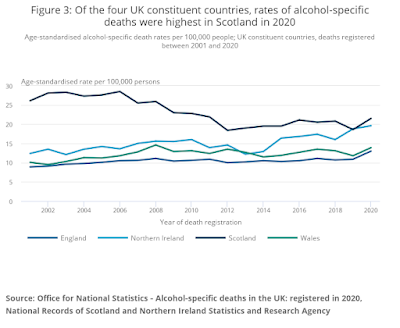From the Belfast Telegraph (and various other local newspapers)...
Concerns over biggest drinking households buying even more during lockdownHealth campaigners have called for a minimum price per unit to be introduced in England...
Of course they have.
...after a study found the biggest drinkers bought more alcohol during lockdowns even though pubs were closed.
Perhaps these health campaigners should call for pubs to be open 24 hours a day?
An academic study of 80,000 households’ shopping habits could explain why 2020 saw the biggest increase in alcohol-related deaths in the UK in the last 20 years.
Health experts found Britain’s heaviest drinkers – those in the top 20% of alcohol-buying households – purchased 17 times more drink from shops and supermarkets than those in the bottom 20% during the first lockdown.
Official data shows that in 2020 there were 8,974 registered deaths from alcohol-specific causes in the UK in 2020 – up 18.6% increase on 2019 and the highest year-on-year rise in two decades.
British supermarket-panel data suggest no increases in overall sales and purchases of alcohol following COVID-19 lockdowns, yet survey and mortality data suggest otherwise. This paper attempts to unravel the paradox.
But mortality data does not and could not suggest otherwise. Alcohol-related mortality rose sharply in 2020, but that does not imply that overall sales of alcohol rose. There is only a paradox here if you believe the discredited whole population theory of alcohol which assumes that there is a fixed link between per capita alcohol consumption and alcohol-related mortality.
The pandemic has once again shown that this theory, which has never been supported by evidence, is wrong. As I said a year ago...
Alcohol sales fell during lockdown and per capita consumption in 2020 seems to have been similar to previous years (we don't have comprehensive figures yet). Orthodox 'public health' theory suggests that we shouldn't see a rise in alcohol-related harm without a rise in per capita consumption. Moreover, the amount of alcohol advertising fell dramatically during lockdown and availability was greatly limited by bar closures. Since these are (supposedly) two of the main drivers of consumption, we should have seen a substantial decline in per capita consumption and a commensurate decline in alcohol-related harm.We saw none of that. Instead we saw a spike in alcohol consumption among some (presumably heavy) drinkers which seems to have led to an almost immediate increase in harm. All of this leads to the common sense conclusion, which is alien to the neo-temperance lobby, that harmful drinking is driven by personal circumstance rather than 'commercial determinants'. Efforts to tackle harmful drinking should therefore focus on harmful drinkers rather than the whole population.
Rather than accept that the theory is mistaken, 'public health' academics portray evidence that disproves it as a paradox (see also: the alcohol harm paradox and the French paradox).
The obvious explanation for this 'paradox' is that some heavy drinkers started drinking even more during lockdown while some moderate drinkers drank less. Anybody could work that out in a few seconds without needing academic qualifications or research funding.
Sure enough, that is what the study found.
Increases in purchases were predominantly driven by households that were usually the highest purchasers of alcohol. The top one fifth of purchasing households (by how much they normally purchased) increased their purchases 17 times more than the bottom one fifth of purchasing households.
Fancy that.
That the heaviest buyers of alcohol increased their purchases the most, with some independent impact of socio-economic disadvantage, might explain why reported alcohol problems and recent alcohol-related death rates might have increased.
D'ya think?!
Obvious though it is, the result of this extreme natural experiment - in which people were confined to their homes and the closure of hospitality restricted the availability of alcohol - should provide food for thought for 'public health' academics. The rise in alcohol-related mortality was clearly not the result of what they lazily assume to be the drivers of heavy drinking: advertising, affordability and availability. Furthermore, it was not related to per capita consumption.
The authors do not address the question, but the most likely explanation is that a dramatic change in people's circumstances led to a change in behaviour. Boredom, social isolation and anxiety are enough to explain why a minority of drinkers consumed much more alcohol during lockdown, with predictable consequences for their health.
Orthodox 'public health' ideology does not have a solution to these problems and so they ignore them in favour of easier political targets. Laughably, the authors even try to crowbar minimum pricing into their conclusion.
That the increase in purchases was much less pronounced in Scotland and Wales, compared with England, could be attributed to the minimum unit price of alcohol introduced in both jurisdictions, such a policy shown to reduce alcohol purchases, particularly amongst the heaviest purchasing households during times of lockdown.
Regardless of whether minimum pricing reduces purchases, it didn't prevent Scotland and Wales seeing a sharp rise in alcohol-related mortality in 2020 that was very similar to the rise seen in England. The authors don't mention this. I can't think why.
I guess that's another 'paradox' for someone to investigate...


No comments:
Post a Comment